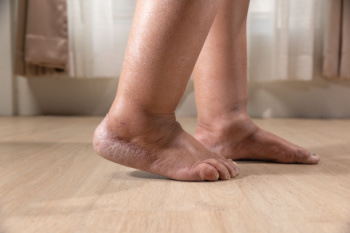Connect With Us
Blog

Swollen feet, or edema, can result from various factors. Spending long hours on your feet, such as during extended work shifts or prolonged standing, can cause fluid to accumulate in the lower extremities. Excessive salt intake contributes to fluid retention, exacerbating swelling. Injuries, such as sprains or fractures, often lead to localized swelling as part of the body's inflammatory response. Pregnancy also commonly causes swollen feet due to increased blood volume and pressure on the veins. Each of these causes affects fluid balance and circulation, leading to discomfort and visible swelling. If you notice your ankles and feet have become swollen, it is suggested that you contact a podiatrist who can accurately determine the cause, and offer you effective relief methods.
Swollen feet can be a sign of an underlying condition. If you have any concerns, contact Philip K. Schrumpf, DPM of Active Feet Clinic. Our doctor can provide the care you need to keep you pain-free and on your feet.
Swollen feet are a common ailment among pregnant women and people who stand or sit for extended periods. Aging may increase the possibility of swollen feet and patients who are obese often notice when their feet are swelling too. There may be medical reasons why swollen feet occur:
- Phlebitis - A condition that causes the veins to become inflamed and can also cause leg pain.
- Liver disease - This may lead to low blood levels of albumin which is a protein. This can cause fluid in the blood to pass into the tissues and several areas of the body can become swollen.
- Heart failure - When the heart doesn’t pump properly the blood that is normally pumped back to the heart can pool in the veins of the legs causing swollen feet.
- Kidney disease - One of the main functions of the kidneys is releasing excess fluid in the body. This type of condition can make it difficult for the kidneys to function properly, and as a result the feet may become swollen.
- Deep-vein thrombosis (DVT)- This is a serious condition where blood clots form in the veins of the legs. They can block the return of blood from the legs to the heart which may cause the feet to swell. It is important to be treated by a podiatrist if this condition is present.
Swollen feet can also be caused by bone and tendon conditions, including fractures, arthritis, and tendinitis. Additionally, there may be skin and toenail conditions and an infection may cause the feet to swell. Patients who take medicine to treat high blood pressure may be prone to getting swollen feet.
Many patients elevate their feet to help relieve the swelling and this is generally a temporary remedy. When a podiatrist is consulted the reason behind the swelling can be uncovered and subsequently treated.
If you have any questions please feel free to contact our office located in Missoula, MT . We offer the newest diagnostic tools and technology to treat your foot and ankle needs.

Many people overlook their toes until they experience discomfort, but your toes and toenails can offer significant insights into your overall health. They may reveal signs of infections, side effects from medications, physical trauma, and autoimmune disorders. Toe pain can also point to chemical exposure, diabetes, kidney or liver diseases, and even skin cancer. Health issues often become apparent first in the extremities. Changes such as tingling, burning, and numbness should not be ignored. Discoloration or alterations in nail shape also can be early indicators of conditions like anemia or melanoma. For example, spoon-shaped nails can point to anemia, while dark vertical bands on the toenail might indicate melanoma. Cold or blue toes can be a sign of heart disease, and painful, inflamed toe joints could suggest arthritis. Regular visits to a podiatrist can help to detect these signs early, allowing for prompt treatment and preventing more severe health issues. If you are experiencing toe pain, it is suggested that you schedule an appointment with a podiatrist for an exam, diagnosis, and treatment.
Toe pain can disrupt your daily activities. If you have any concerns, contact Philip K. Schrumpf, DPM of Active Feet Clinic. Our doctor can provide the care you need to keep you pain-free and on your feet.
What Causes Toe Pain?
Most severe toe pain is caused due to a sports injury, trauma from dropping something heavy on the toe, or bumping into something rigid. Other problems can develop over time for various reasons.
Toe pain can be caused by one or more ailments. The most common include:
- Trauma
- Sports injury
- Wearing shoes that are too tight
- Arthritis
- Gout
- Corns and calluses
- Hammertoe
- Bunions
- Blisters
- Ingrown toenails
- Sprains
- Fractures (broken bones)
- Dislocations
When to See a Podiatrist
- Severe pain
- Persistent pain that lasts more than a week
- Signs of infection
- Continued swelling
- Pain that prevents walking
Diagnosis
In many cases the cause of toe pain is obvious, but in others, a podiatrist may want to use more advanced methods to determine the problem. These can range from simple visual inspections and sensation tests to X-rays and MRI scans. Prior medical history, family medical history, and any recent physical traumatic events will all be taken into consideration for a proper diagnosis.
Treatment
Treatments for toe pain and injuries vary and may include shoe inserts, padding, taping, medicines, injections, and in some cases, surgery. If you believe that you have broken a toe, please see a podiatrist as soon as possible.
If you have any questions please feel free to contact our office located in Missoula, MT . We offer the newest diagnostic tools and technology to treat your foot and ankle needs.

Achilles tendon pain can significantly affect mobility and daily activities. The Achilles tendon, which connects the calf muscles to the heel, plays a vital role in walking, running, and jumping. When pain occurs, it can indicate conditions ranging from tendonitis to a complete rupture. One method podiatrists use to diagnose an Achilles tendon rupture is the Thompson test. The patient lies prone with their foot hanging off the edge of the exam table. The podiatrist then squeezes the calf muscles. If the Achilles tendon is intact, the foot will flex downward naturally. If it does not respond, the lack of movement suggests a complete rupture. Untreated Achilles tendon issues can lead to prolonged discomfort and further injury. A podiatrist not only performs diagnostic tests, such as the Thompson test, but also provides comprehensive treatment tailored to the specific condition. If you are experiencing Achilles tendon pain, it is suggested that you schedule an appointment with a podiatrist for an exam, diagnosis, and treatment options.
Achilles tendon injuries need immediate attention to avoid future complications. If you have any concerns, contact Philip K. Schrumpf, DPM of Active Feet Clinic. Our doctor can provide the care you need to keep you pain-free and on your feet.
What Is the Achilles Tendon?
The Achilles tendon is a tendon that connects the lower leg muscles and calf to the heel of the foot. It is the strongest tendon in the human body and is essential for making movement possible. Because this tendon is such an integral part of the body, any injuries to it can create immense difficulties and should immediately be presented to a doctor.
What Are the Symptoms of an Achilles Tendon Injury?
There are various types of injuries that can affect the Achilles tendon. The two most common injuries are Achilles tendinitis and ruptures of the tendon.
Achilles Tendinitis Symptoms
- Inflammation
- Dull to severe pain
- Increased blood flow to the tendon
- Thickening of the tendon
Rupture Symptoms
- Extreme pain and swelling in the foot
- Total immobility
Treatment and Prevention
Achilles tendon injuries are diagnosed by a thorough physical evaluation, which can include an MRI. Treatment involves rest, physical therapy, and in some cases, surgery. However, various preventative measures can be taken to avoid these injuries, such as:
- Thorough stretching of the tendon before and after exercise
- Strengthening exercises like calf raises, squats, leg curls, leg extensions, leg raises, lunges, and leg presses
If you have any questions please feel free to contact our office located in Missoula, MT . We offer the newest diagnostic tools and technology to treat your foot and ankle needs.
Blog Archives
- August 2024
- July 2024
- June 2024
- May 2024
- April 2024
- March 2024
- February 2024
- January 2024
- December 2023
- November 2023
- October 2023
- September 2023
- August 2023
- July 2023
- June 2023
- May 2023
- April 2023
- March 2023
- February 2023
- January 2023
- December 2022
- November 2022
- October 2022
- September 2022
- August 2022
- July 2022
- June 2022
- May 2022
- April 2022
- March 2022
- February 2022
- January 2022
- December 2021
- November 2021
- October 2021
- September 2021
- August 2021
- July 2021
- June 2021
- May 2021
- April 2021
- March 2021
- February 2021
- January 2021
- December 2020
- November 2020
- October 2020
- September 2020
- August 2020
- July 2020
- June 2020
- May 2020
- April 2020
- March 2020
- February 2020
- January 2020
- December 2019
- November 2019
- October 2019
- September 2019
- August 2019
- July 2019
- June 2019
- May 2019
- April 2019
- March 2019

